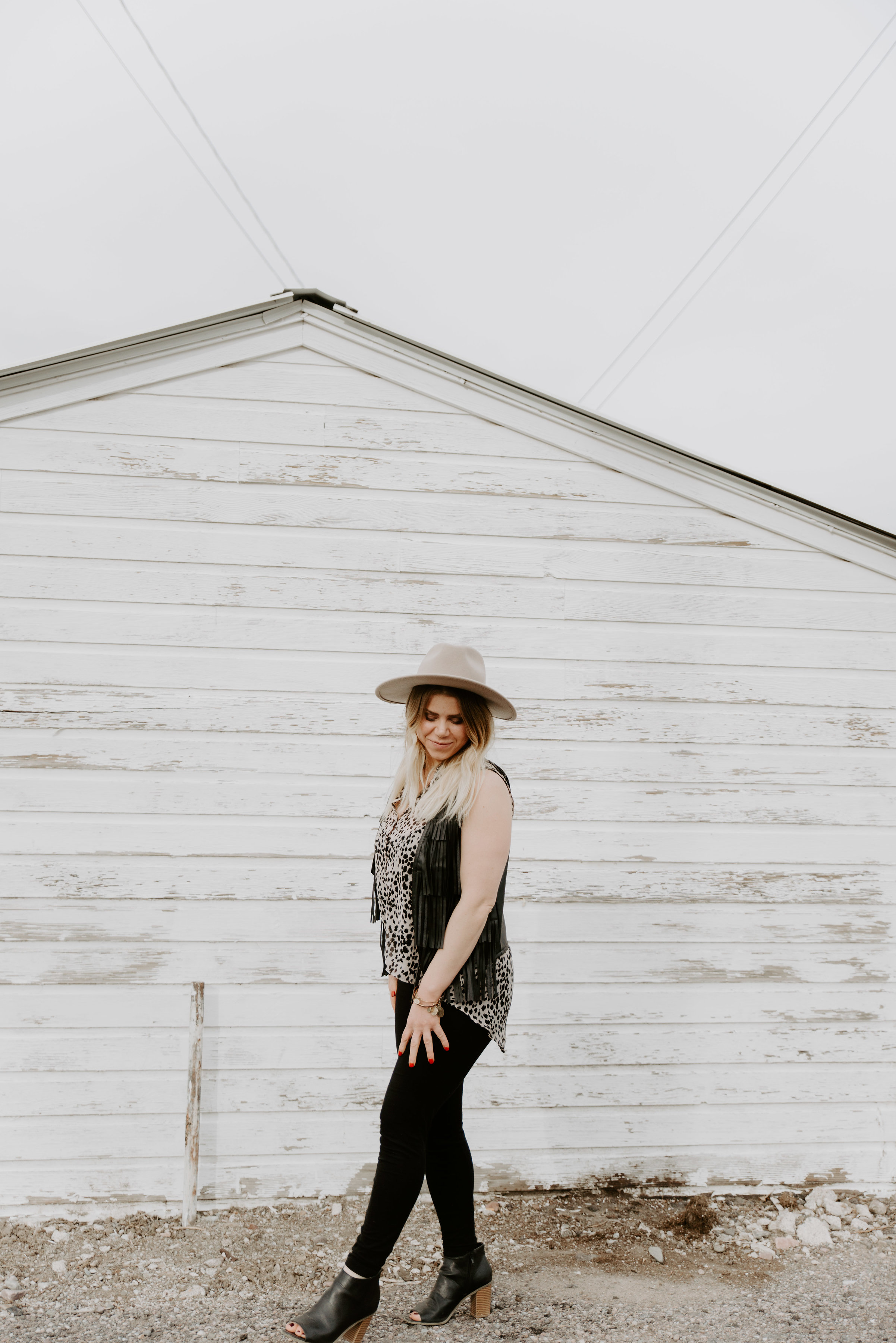BEING KIND > BEING RIGHT
Images by Brooke Richardson Photography
Have you ever been talking with a group of people, and someone in the group starts spouting off a bunch of facts that aren'ttttt exactly true, and you feel compelled to set them straight? Or they start wildly embellishing a story, and you feel the urge to offer the, you know...TRUE version? Or maybe you're arguing with a friend, and they really messed up and dropped the friendship ball, and are getting defensive and combative when you call them out on it.
I don't know about you, but in situations like these, my hunger to be right is POWERFUL. They're wrong, and the world needs to know.
“I am practicing being kind instead of being right.”
The more I learn about life, the more I realize how inferior being right is to being KIND. Kindness trumps all. However, it should be noted: Kindness doesn't necessarily mean nodding agreeably when someone is spewing inaccuracies that could be harmful/hurtful to others/lead them astray in a significant way. But if your friend is regaling others with her tale of being up front at the Beyonce concert (when in reality she was sharing binoculars with you in the nosebleeds), what's the big deal? Does it hurt anyone? Why embarrass her in front of others, just to set the record straight?
“Not all truths need to be voiced”
What's more important is to focus on what's causing that person to act the way they're acting, and say the things they're saying. Why do they feel the need to bolster their credibility/image/etc? Are they feeling undervalued and depressed? Are they bumming about a rejection, in their personal or professional life? Are they insecure about their worth? Or in the example of them being a less than ideal friend, what led them to make that mistake?
“Open-minded people don’t care to be right. They care to understand. There’s never a right or wrong answer. Everything is about understanding.”
It can be really tough, but oh-so-more rewarding to check your ego and anger, and dig a little deeper. Dissolve your anger with kindness, compassion, and empathy. At least try to understand why they did what they did. If you do, it's actually a win win: It encourages a more peaceful and effective solution, which discourages repeat occurrences. If you can tease out the root of the problem, you can be the friend they need, and likely prevent it from re-manifesting (as suppressed, unresolved issues often do).
xx,
-w-
IT'S NOT ME IT'S YOU
Even if you're genuinely the sweetest person alive, you've felt frustrated by another person, right? Or you've gone after something sought by others, like a job, or a house...or even a parking space!
Let's say you and someone at work are competing for an opportunity. There is only one spot available and you both have your sights set on it.
On a basic level, what is your need here?
Spoiler alert: Your need is NOT for the opportunity itself. Depending on what the opportunity is, your need may be for financial security. It may be for growth and progress. It may be for acknowledgement of your hard work. That particular opportunity is a vehicle, or method, for fulfilling that need.
So ask yourself: Is there another way to get your need(s) meet without this specific opportunity?
YES!
You could get a promotion or an award. You could even change jobs or branch out on your own. You could find another source of income.
The point here is:
“No two people’s needs are ever in conflict. Only the strategies for getting those needs met are in conflict.”
Reflect on a recent conversation that could have gone better, or a conflict you experienced. Maybe you're battling with a significant other, or a friend, or a boss, or a customer service representative. Strip away the rest and drill down on what your common, basic needs are. Maybe it's the need to provide a cohesive, stable environment for your kids [spouse]. Maybe your needs are to feel supported and heard [friend]. Maybe you need to feel valued and trusted [boss]. Maybe the needs are efficiency and reparation [customer service rep].
Focus on those common needs and remember: at our core, we all have the same basic needs. What varies are our ideas for how to meet those needs. Some seek validation through fancy possessions and high socioeconomic status. Some look for love in toxic relationships. Some think hoarding what's "theirs" [time/money/ideas/energy] is the only way to ensure there's enough for them. Some of these methods work, and some not so much. Some are harmless, some are harmful - to self/others. Whatever your method is, try to choose one that serves the highest good. So let's do our best to remain open and empathetic to others as we navigate life and work on getting those needs meet.
“Negative feelings come from unmet needs.”
Anger could stem from a need for respect that isn't honored. Confusion could signal a lack of communication and honesty that are needed. Impatience could be from a need to be understood. Or lezbereal - maybe you're just friggin' HANGRY and need some F O O D!
Strive for internal and external awareness, and look for ways to meet those mutual needs. If you're ever in doubt regarding just what those needs are, do your best to communicate with an active ear and an open mind. If possible, eliminate assumptions and seek confirmation from the other person/people. Put down the gloves and halt the hostility. Sometimes opposition/competition is unavoidable (e.g. vying for a job, or spot on a team, etc) but at the very least, identifying those needs helps you relate to and empathize with the other(s).
One love,
-w-
F O R G I V E N E S S
Images taken by Abbey Armstrong Photography
Images edited by Brooke Richardson Photography
“Forgiveness means giving up all hope for a better past.”
Think about the last time you were physically hurt. You likely did something to address the pain, right? Popped an aspirin, threw on a rad Power Rangers Band-Aid (because everyone knows cool BandAids are more effective than regular, boring Band-Aids). Even if you try to avoid medicine, you probably took some measure to ease the discomfort (cold washcloth/rest/essential oils/etc). How long did you wait to do something about it?
In her book You Are A Badass, author Jen Sincero brilliantly articulates the power of forgiveness. She highlights the distinction between how we typically treat physical pain as opposed to emotional pain. As she notes, we're typically very proactive and quick on the draw to banish our physical pain...even if this involves the initial discomfort of pouring stinging disinfectant on an open wound or powering through getting stitches. We're motivated to do it right away, because we're intent on our ultimate goal of R E L I E F.
“They caused the first wound, but you are causing the rest; this is what not forgiving does. They got it started, but you keep it going. Forgive and let it go, or it will eat you alive. You think they made you feel this way, but when you won’t forgive, you are the one inflicting the pain on yourself.”
However, when it comes to emotional pain, we're apparently down to see just how much torture we can endure, wallowing in our "guilt, shame, resentment, and self-loathing, sometimes for entire lifetimes." Ring any bells?
“Holding onto anger is like drinking poison and expecting the other person to die.”
We prolong our misery by clinging to our ill feelings. We do this by badmouthing our boss/fantasizing about telling our overbearing mother-in-law where to stick it/pondering the many reasons our enemies are wrong and the many reasons we're right. As Sincero points out, we relive our worst moments over and over and over instead of letting them go. Doing so, we pick at the emotional scabs, thereby refusing healing and preventing the pain from subsiding.
“Reminder: Forgiveness is a process. A choice you have to make over and over, until you’re free from the negative feelings.”
I'm sure this isn't the first time you've heard this. We all know we should release our resentments and let that shiz go. It's one thing to know it - it's another to do it. And I can completely relate. I'm definitely not immune to the self-inflicted pain by clinging to past wrongs others have done me, particularly the big whammies. Through effort and mindfulness it's become much easier, but I still have my moments. Rarely do the negative feelings immediately dissolve upon deciding to forgive. They can linger, sometimes re-surfacing after you thought you'd fully released them. Depending on the severity of the wrongdoing, forgiveness is usually a process. A decision you have to make repeatedly. Be patient with yourself and know it's okay if you occasionally get sucked back into the angry/hurt vortex - all that matters is that you find your way back out.
“When someone does something wrong, don’t forget all the things they did right.”
We all have our own stories of people royally screwing us over. It's life. We've (unintentionally or otherwise) done wrong by others. Here's what I remind myself to make the process easier:
- Being a human is hard sometimes, and a little grace toward someone goes a long way. Hurt people hurt people.
- I'm so grateful for the forgiveness others have extended to me. Who am I to withhold it from others?
- it's friggin' EXHAUSTING to hang onto hurt/anger/resentment.
- Empathy, understanding, and compassion dissolve anger/guilt/resentment. I always try to understand why the person did what they did - every time, I'm able to trace it to fear/insecurity/hurt the other person is feeling. This immediately reminds me of our collective humanity, and effectively softens my heart toward them. This doesn't mean you condone their actions, but it allows you to empathize, accept the situation, and move onnnn.
- People fight battles we know nothing about.
- Jumping to conclusions and automatically assuming ill intent often proves wrong. Allowing the person the benefit of the doubt is usually the best tactic. If possible, communicate with the other person to express your concern and provide them with a chance to explain themselves.
- It's often not about you. Step back and be honest with yourself: Are you allowing your insecurities to color your judgment?
IMPORTANT NOTE: This also applies to self-forgiveness!! Be kind to yourself! Forgive yourself for your own indiscretions and slip ups, and be patient with yourself as you work to forgive others.
xx,
-w-
On The Fringe
Images by Brooke Richardson Photography
“Fashion is what you buy. Style is what you do with it.”
I have so many random pieces in my closet. As with many things in my life, I like to have options. Whether we're talking a fragrance, lippy, shoe, or jacket, I've never liked limiting myself to just one, or even just a few. Not only are my tastes versatile, but I'm always compelled to align my current mood/vibe with my scent/look. (This also extends to music and candle selections, but enough about that.) For me to fulfill this urge, I need a sufficient selection!
As a stylist and photographer, having a wide-ranging wardrobe with random pieces spanning multiple decades/eras is invaluable. Literally money in the bank. It's fantastic for business and for my creative needs. If a client wants a retro look, BOOM. I'm all over it. If I feel inspired to style and shoot a '90s grunge concept shoot, I'm set. The tradeoff is having a garage full of clothing because you ran out of space inside. Oops. Owning my own clothing boutique has most definitely enabled contributed.
I adore the thought of minimizing it all to a capsule wardrobe (a collection of a few essential items that don't go out of fashion, which can then be augmented with seasonal pieces). I find beauty and value in reducing my wardrobe to a small number of classic, quality, timeless pieces. Creating my own personal style legacy, in a sense. But then a rad gold puffer jacket catches my eye, or a darling romper, and the collection grows.
It makes my heart sing to have a wide variety to choose from, and to throw random pieces together, like this animal print top with a fringe vest. The hat is from Zara (my fave store), a gift from my sister during our last trip to NYC (isn't she the best?).
Which do you prefer: a broad closet or a capsule wardrobe?
xx,
-w-
H O N E S T . L O V E
Images by Brooke Richardson Photography
“Befriend the man who is brutally honest, for honesty is the highest form of respect.”
One of the things I value most in my friends is their willingness to tell me like it is. They're never abrasive and intentionally brutal - but they love me enough to call me out when needed, and to sidestep the sugarcoating. That right there is true friendship. True honest love.
Think about a time when you were hesitant to be completely honest with a friend for fear of hurting their feelings, making them feel worse, etc. As friends, we often feel compelled to show support. Solidarity. Multiple exclamations of "I gotchu, girl! You tell 'em!" High five them for letting their boss have it, praise them for sticking it to their spouse, applaud them for blowing off an obligation to go out with friends instead. Rationalize their decision for ditching their goal to do xyz. That's what friends are for, right?! W R O N G O.
Now it's time to be honest with yourself. Ready? Okay, here we go. Ask yourself: Why am I reluctant to be honest with my friend? Is it because I feel unsupportive if I don't confirm and validate their action/opinion? Is it possibly because...I am trying avoid the discomfort of telling them like it is?
“The vulnerability that honesty requires isn’t something that everybody can handle. Lying allows people to be comfortable.”
Chances are...it's the latter. Of course, a small part of it is us truly not wanting to rub salt in the wound/make our friends feel bad/worse. But if we're being honest with ourselves - we just personally don't want to experience the uneasiness of acknowledging the truth. Right?! It's easier for everyone to just pretend like, "YES - lighting into that biotch for daring to look at your man was totally the right thing to do." "You go girl for quitting your third job this year - they clearly don't appreciate what a gem you are." "That guy is DEFINITELY into you. He's obvi scared by how much he likes you, so he's not texting." "Yes, you should absolutely buy those $200 jeans even though money's been tight - they look phenomenal on you!"
“Being honest doesn’t get you a lot of friends but it’ll always get you the right ones.”
But if you're truly a good friend - you'll prioritize your friend's overall well-being over your present comfort. You'll sacrifice your comfort for their welfare. Ask yourself: What will serve them best long-term? Leveling with them and gently acknowledging their hurtful behavior (hurtful to you, to them, to others)? Kindly helping them face facts and address their issues? Guess what?! Doing so will help them significantly more in the long run, by helping them grow and evolve and escape their limiting thoughts/actions.
Once you've spoken your truth, offer support and love. Provide encouragement. It's not enough to just identify the issue - actually help them through it! If roles were reversed, wouldn't you rather have someone give it to you straight, instead of simply placating you? It might sting initially, but trust me - confronting the issue head on now stings a helluva lot less than if you were to avoid it and have it grow and sucker punch you later.
“Be honest, brutally honest. That’s what’s going to maintain relationships. ”
Furthermore, when you're honest with someone, your praise and compliments will carry considerably more weight. They'll recognize your authenticity and know you mean what you say.
“Honesty has a beautiful and refreshing simplicity about it. No ulterior motives. No hidden meanings. An absence of hypocrisy, duplicity, political games, and verbal superficiality. As honesty and real integrity characterize our lives, there will be no need to manipulate others.”
The truth is... I love you all.
xx,
-w-
C O N N E C T I N G
Images by Brooke Richardson Photography
“Connect deeply with others. Our humanity is the one thing that we all have in common.”
Ya girl Melinda bringing the wisdom and the opener for today's post on connecting with others.
Before we start, do me a favor, please, and reflect on people with whom you just VIBE. You seem to connect on the deepest of levels, and you just get each other. It's as if you're twin souls, as if you're cut from the same cloth.
Now please (so polite, I know) think of people with whom you definitely do NOT vibe. No matter how hard you try (or don't try - because sometimes it's exhausting), you just.cannot.get.on.the.same.page. You may not feel ill will toward them, but you'd be just peachy if you never cross paths again.
You likely know people whom fall on both ends of the above-outlined spectrum - as well as people sprinkled in between. C'est la vie (translation for the non Francophiles: such is life). The reality is, some of these people from whom you feel disconnected may be people you can't necessarily shun from your life completely. They could be coworkers/in-laws/spouse's friends/bosses/etc. They ain't going anywhere.
Do you ever wonder what you can do to bridge the gap between you and your non-soulmates? If so, B O O M. Today we're going to explore ways to enrich and solidify your connections with others - or at the very least, just hopefully make it less friggin' awkward and painful.
“I define connection as the energy that exists between people when they feel
SEEN, HEARD, AND VALUED:
when they can give and receive without judgment; and when they derive
SUSTENANCE AND STRENGTH
from the relationship.”
Think back to your fellow vibers. Think about how you feel during and following interactions with them. You likely feel acknowledged, right? You feel like they "see" you, they hear you, they value you. You don't feel judged or criticized. If they do dish out tough love (which in my opinion is when you KNOW you have a solid friend - more in a later post), you know it stems from a place of pure love. They care about you enough to call you out when necessary. You feel strengthened, boosted, and re-charged after speaking with them, not drained, depleted, and depressed.
Let's dissect this for methods you can use to be this person for others:
- Make the other person feel heard
“Don’t listen to reply. Listen to understand.”
LISTEN. Truly listen. Identify the non-verbals, focusing on what they're not saying (their body language, their insinuations, their possible motivations, etc). Clear your hands and your attention and give it all to them, baby. Think about how delicious it feels when someone gifts you with their full attention. Something so simple can truly have a powerful effect. It has the power to soften defenses, lower walls, enhance communication, etc. I mean, at the very least, the sooner the other person feels heard, the sooner the encounter will likely end. But...you may surprise yourself. By truly taking the time to focus on the other person and absorb their message, the more invested and engaged in the relationship you'll feel. One of the most sincere forms of respect is actually listening to what another has to say.
- Be truly curious and show a genuine interest.
Ask questions. Show a genuine interest. Everyone knows something you don't. Doesn't it feel amazing when you can tell someone is taking a true interest in your life/message? Confidence booster for sure!
Without fail, the most charismatic people I know are those showing a genuine interest in others. They ask deep(er) questions, listen, then ask follow-up questions. They pay genuine compliments, beyond the "You look cute" or "You're a babe." Don't get me wrong - any genuine compliment is a good compliment - but the truly effective connectors are those who take it one step further and one level deeper. You feel like they're actually addressing you, not just any other friend of theirs.
- Meet them halfway
“If you talk to a man in a language he understands, that goes to his head. If you talk to him in his language, that goes to his heart.”
Drop the pretenses. The condescension. The need to show how fabulously fabulous you are. Keep it R E A L, amigos. Chances are, if you listen, you can get a feel for where the other person is coming from and meet them there. Especially if you recognize they're making an effort, don't make them go it alone. Reach out a hand.
Initially, you may have to go more than halfway, maybe even the whole way solo. Decide if you'd rather have smug justification or happy co-existence. Self righteousness is a lonely road.
And maybe you find that person I N S U F F E R A B L E. Irritating as hell. You find them ignorant, or abrasive, or self-absorbed, or whatever. Read on, my friend.
- Do your best to remain non-judgmental and open minded.
This is particularly hard when you feel they're judging you, and especially hard when you KNOW they're judging you (as evidenced by their expressed verbal judgments - in other words, they just freaking told you so). Just know that judgment stems from fear/insecurity/anxiety. People who are secure and love themselves don't feel compelled to chase feelings of superiority (however fleeting) by judging. And if they sense you're judging them (whether you are or aren't), this will likely exacerbate the session. So let it be clearly known you love and accept them as they are. This will hopefully inspire and encourage them to extend the same respect to you.
In conjunction with being non-judgmental, try to remain open minded. The person may say/do things you consider abominable, or lame, or ignorant, or EW. Hear them out, reserve judgment, and unless they're plotting to do something atrocious like murder bunnies, live and let live! Accept and celebrate your differences. Give them - and yourself - space to be yourselves.
- Grant them grace.
Understand if they're being rude/self-centered/etc, it's because of insecurity/fear/anxiety. They - just like you - are doing the best they can. It's hard being human sometimes! *Genuinely* helping them feel heard and special and valued will go a long way toward bridging that gap, and will likely lessen their compulsion/need to prove themselves to you/others, and to seek external validation.
Social anxiety is a very real thing, and for some it can be debilitating. That person you'd wish would stop monopolizing the conversation to brag about how incredible they are? They may suffer from crippling social anxiety, and simply don't know how to connect with another, so they fall back on what they know - themselves. They use it as a crutch, and would likely be horrified if they knew how they were being perceived. Trust me, it's not fun to be around, but hopefully by letting them feel heard and valued - and then gently steering the conversation to other topics - you can help them and set the precedent for better future interactions.
Release your need for validation, and your urge to show off. Not that you can't share wins - after all, true conversation should be about reciprocity - but try focusing on the other person and less on yourself.
- Focus on your commonalities
Maybe you both love tacos. Maybe you both think Tom Hardy is the dreamiest man on the planet (because he is). Maybe you share political views or an aversion to screamo emo music. If it's your mother in law, you obviously both love her son/your husband. If it's your boss, you both want the company to succeed. Whatever is, try to find and cultivate that common ground. If you're totally drawing a blank, chances are you're both humans who just want to be happy - so focus on that until you discover something else.
- Allow vulnerability.
“We may impress people through our strengths, but we connect with people through our weaknesses.”
How relieving is it when you realize the person you thought was superhuman is actually, in fact, a mere mortal? Who struggles to find time/energy to clean/work out/fold laundry? Who feels just as insecure as you about their momming skillz or math know how? Nurture vulnerability, in you and them. Give them permission to let down their guard and be vulnerable by taking the lead and being vulnerable yourself.
Often they put on a front because they feel intimidated by Y O U. By being the first to drop the cape and superhero mask, you can take the first step toward truly connecting. People typically open up if they know you care. Give them a safe space to do so.
“People don’t care how much you know until they know how much you care.”
- Remain true to you.
Obviously do right by them, but also by you. Sometimes this entails drawing a line in the sand and speaking your truth. Gently but firmly standing up for yourself. Repelling toxicity and promoting good vibes.
- Practice self awareness.
“People can only meet you as deeply as the’ve met themselves.”
Just like you'd really like your bro's friend to get a friggin' clue how obnoxious it is to hear him tell inappropriate jokes loudly for all to hear - try to dig deep and reflect ways you could be contributing to the chasm. Is there any way your words/actions could be misperceived? This can be a slippery slope, so be careful not to go down the rabbit hole into full-fledged self consciousness. Just simply try to be aware. Maybe even ask a trusted loved one for insight.
- Level with them.
If you're still not where you want to be with the other person - try leveling with them and directly addressing the issue. Explain you feel distance, ask if the feeling is mutual, and express your desire to resolve this. Listen to what they have to say and do your best to remain open and willing to compromise.
If you have your own tips, or examples of finally connecting with someone after deliberate effort, please share in the comments below!
One thing's for sure, I love you all.
xx,
-w-






























